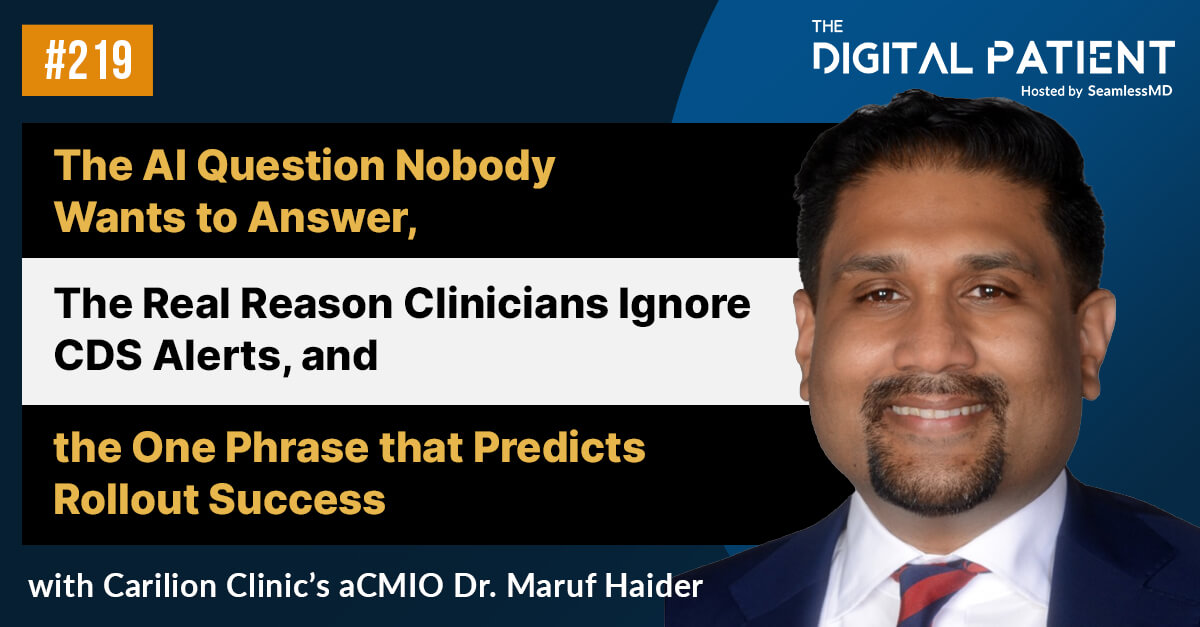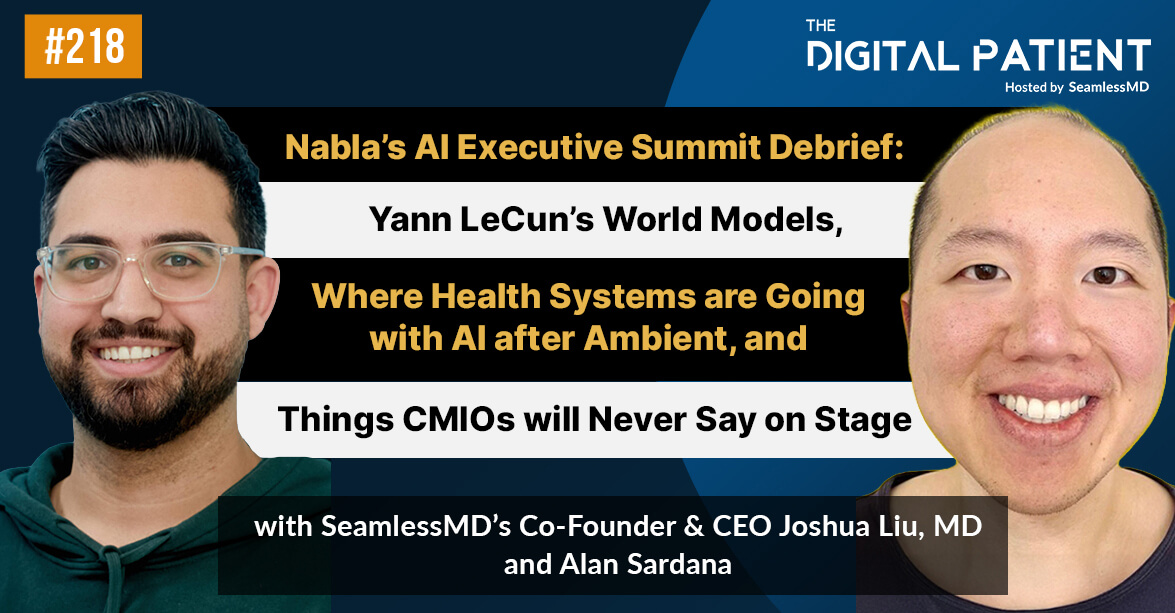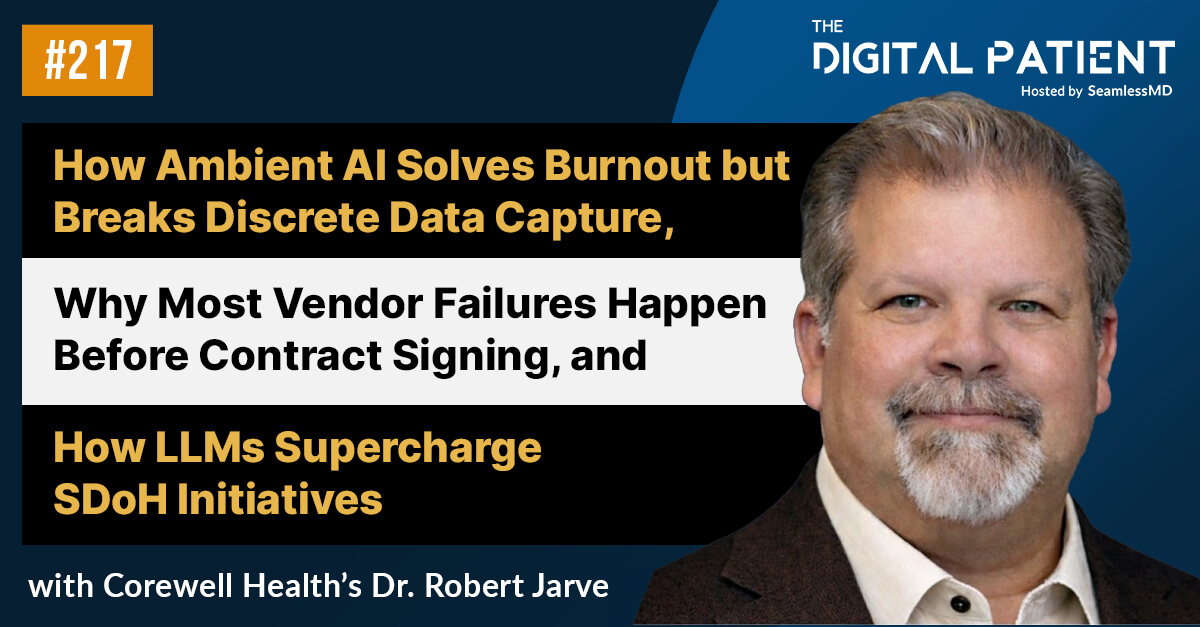Subscribe on: RSS | SPOTIFY | APPLE PODCAST | GOOGLE | BREAKER | ANCHOR
On this episode of "The Digital Patient" podcast, hosts Alan Sardana & Dr. Joshua Liu speak with Brian Dobosh, Vice President of Digital Health Systems at RWJBarnabas Health, about "Achieving Epic’s perfect 10 gold star ranking, implementing a feedback intake process to scale innovation, why your EHR interoperability framework should be like an onion, and more". Click the play button to listen or read the show notes below.
Audio:
Video:
Guest(s):
- Brian Dobosh, Vice President of Digital Health Systems at RWJBarnabas Health
- Dr. Joshua Liu (@joshuapliu), Co-founder & CEO at SeamlessMD
Episode 87 - Show Notes:
[00:00] Introducing Mr. Brian Dobosh, Vice President of Digital Health Systems at RWJBarnabas Health;
[1:40] How Mr. Dobosh had the opportunity to gain a broad understanding of RWJ Barnabas Health through two internships, solidifying his desire to work in healthcare and why he stayed for the opportunity to build on the EMR, the culture and people he worked with, as well as for the impact his work had on patient care;
[3:45] Why Mr. Dobosh appreciates the culture at RWJBarnabas, where they've doubled down on Epic with a core value of putting the patient first;
[05:04] How Mr. Dobosh sees his career in two parts–before and after Epic–where before was improving the system through a provider-focused lens and now the focus is on patients through various initiatives like MyChart, Care Everywhere, Looking Glass (Telehealth), etc. and how these initiatives have had a profound impact on patient experience and adoption;
[7:10] Why Mr. Dobosh believes the adoption success with MyChart is due to communicating the benefits it offers to patients, such as the ability to schedule appointments and view their medications, and also the automatic activation system implemented to remind patients to sign up, which has helped to increase the adoption rate.
[9:00] How RWJBarnabas went from 7 different EMRs to Epic;
[10:10] Mr. Dobosh explains his metaphor of the "Frankenstein" EMR system, which refers to a situation where a healthcare organization has multiple EMR systems that do not interact well with each other, and the alternative approach to EHR, the "Onion", where each layer builds on the core (the EHR), including internal and external sharing with partners and affiliates, access for referral networks, all with the goal of putting the patient first, providing continuity of care and making it easier for providers to access patient information;
[17:11] Why Mr. Dobosh suggests evaluating the economy of scale is not just the cost of implementing and managing one EHR system compared to multiple systems, but also how it affects the patient, with a focus on continuity of care, maintaining a single record and dedicating an IT team to manage one instance;
[19:10] How RWJBarnabas achieved Epic's perfect 10 gold star ranking and why Mr. Dobosh attributes this success to the leadership team's investment and commitment to building the system with best practices and putting the patient first, with a goal to continuously improve and innovate.
[21:45] How Mr. Dobosh views his role in digital health as a mix between technology and patient experience, and his job is to evaluate and implement technology that improves both patient and provider experience.
[24:20] How ideas for new technologies and projects across the 7 hospital system are brought up by local hospitals and why there is a need for governance and prioritization when it comes to implementing these initiatives;
[27:27] Mr. Dobosh describes an evolving process where ideas are submitted through a feedback intake process and reviewed locally by a council before being considered for implementation. The goal is to ensure that ideas are vetted, make sense for the organization, and that everyone feels heard.
[28:30] Why Mr. Dobosh is focused on three areas:
- Experience - how patients and providers interact with technology, and making those interactions more meaningful, less cumbersome, and less noticeable, similar to a baseball umpire doing a great job in a game;
- Engagement - how patients interact with the healthcare organization, through reminders about health, the ability to connect with someone through front doors to ask medical questions or schedule appointments;
- Equity - how to help underserved communities not get left behind by digital technologies. This includes helping bridge the gap for those who lack knowledge, skills, or resources to interact with digital health products;
[31:55] How Mr. Dobosh considers new technology projects against the framework of digital engagement, experience and equity... if the project is detrimental to one of the tenets, they will not do it;
[33:33] Why Mr. Dobosh considers adding a new feature only if it can integrate with Epic, or if it will be added in upcoming update, to avoid adding a lot of vendors and creating a "Frankenstein" system with duplicate functionality;
[35:00] Why Mr. Dobosh is a proponent of imagining himself (and others he's speaking with) as patients when encountering pushback as it helps to reframe the discussion;
[38:50] Why Mr. Dobosh is most excited about Remote Patient Monitoring, using consumer devices for chronic disease management, and reducing the need for patients to travel to hospitals and clinics.
Fast 5 / Lightning Round:
- Mets or Phillies?
“Mets"
- Who is a person–dead or alive–you’d love to meet?
“Founding Fathers"
- Would you rather have Super strength, super speed, or the ability to read people’s minds?
“Mind reading”
- What is something in healthcare you believe that others might find insane?
“If I flip the wrong switch, someone could die.”
- COVID-19 lockdown related – what is 1 hobby or activity you’ve gotten into since the pandemic?
“Guitar and Hydro-rowing”
.svg)










.png)
